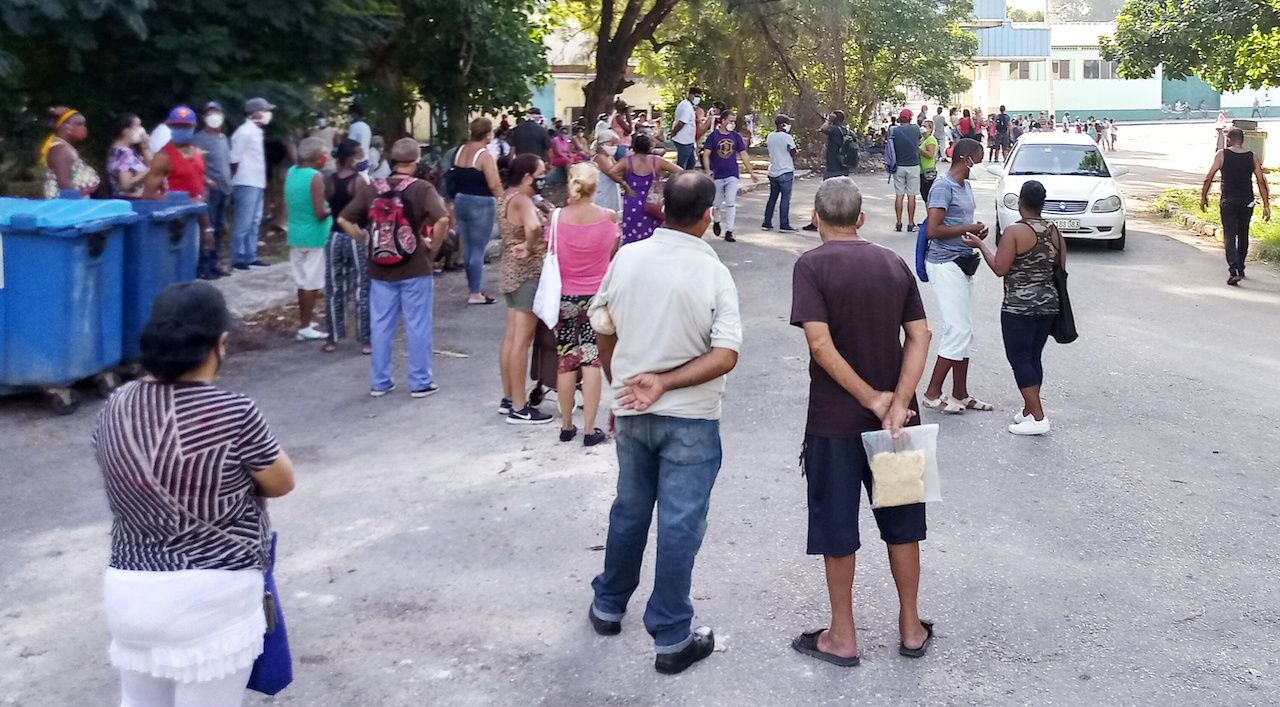Several months ago, amidst the shortages exacerbated by the Covid-19 pandemic and the "Ordering Task," the Cuban government began to market food and toiletry "modules" in national currency, almost always consisting of chicken, mincemeat, oil and detergent. They are distributed at the rate of one per ration book; that is, per family unit, although these units can be made up of anywhere from one to sixteen people.
"In the country's current situation, the Government's egalitarian alternatives mean more poverty, in practice. The modules sold, contingent upon the presentation of a ration book, do not account for the number of members in each family unit. Rather, one simply gets one module for each book. In my family unit there are eight of us, and we get the same module as one with just three people," Orquídea de los Ángeles Miranda, a worker at an entity attached to the Federation of Cuban Women (FMC), told DIARIO DE CUBA.
"The rationing policy has only generated more inequalities and tremendous discontent in the sector of the population with the lowest incomes," she says.
When announcing the start of the Ordering Task, the Government stated that the ration book would remain a distribution mechanism "for as long as this is deemed necessary." Since then, in addition to using it to purchase regulated distribution products, Cubans have had to present it to buy pork at Christmastime and New Year's, and the aforementioned modules, for example. Cigarettes have also been distributed once again using the ration book.
The ten boxes sold weekly to each family, regardless of how many people make it up, are insufficient for many smokers. They do constitute, nevertheless, an opportunity for low-income Cubans who do not smoke to buy and resell them.
"All of us ordinary Cubans are obliged to wait in line for others and work as resellers, to live doing things that the Government considers illegal," says Consuelo Moreno Vega, a nursery school teacher, mother of three children, and a Marianao resident.
"The fact that many products can only be purchased via the ration book does not help the most disadvantaged Cuban families, at all, or result in any decrease in reselling, line holders and many other illegalities that they have been 'fighting' since 1959," she complains.
"Cigarettes are a clear demonstration of this: now they can only be bought with the book, but they only sell 10 boxes per week to each family, regardless of how many people they have, or how many of them are smokers. Right now cigarettes are a form of currency, just like in prison," remarks Moreno Vega, who is forced to resell cigarettes and anything else that is not food or personal hygiene items, to boost her income.
Like most Havanans, Moreno Vega spends practically all her time in line to acquire any products or merchandise that she can later use, exchange or resell, from alcoholic beverages to disposable diapers, cigarettes or soon-to-expire candy.
Based on citizen complaints, Havana authorities realized the how the aforementioned module distribution mechanism is unfair and detrimental to large families.
On July 14 the Government of Havana circulated an internal document entitled "Proposal for the use of the ration book in the commercialization of selected products at CIMEX and Caribe stores."
The document's aim is to rectify the inequalities in the sale of the modules according to the aforementioned system, and to have them distributed based on the number of members in each family, not the number of ration books.
"But the stores do not comply with this, and thousands of excuses are made, such as the (difference in) number of people between one municipality and another," complained Carmen de Armas Rico, a resident of El Canal, in El Cerro.
"At stores like Maravillas and Alborada, here in El Cerro, management informed us that their establishments were not subject to this proposal, issued by the provincial government itself, because our municipality's population density is lower than in others. They do not even realize that it is precisely this logic that led to the enormous inequality between families with few members and other, much bigger ones, like mine."
"It is unfair that a family made up of 16 people, like my own, gets the same module (a five-kg package of chicken, two bottles of oil and two packages of detergent) as other, much smaller ones. And how is it possible that a government directive is being violated by the management of stores, with this affecting families with members in vulnerable situations, as is our case?" De Armas Rico asked.
